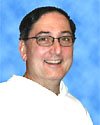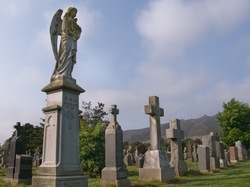The other day my mother and I had the opportunity to visit one of the cemeteries where some our family’s dead rest. Today, my parents went to the other cemetery to make a visit and offer prayer. These visits made me think. The gives us an opportunity to make an act of devotion which annually begins on November 2nd and is carried through the month of November. Namely, Mass are said, prayers offered for the dead and we make visits to the cemetery to keep alive the names/memory of our deceased family and friends’ in front of God by asking God to be mindful of our loved ones with mercy. Hence, we pray for the dead, for those in purgatory (those who are saved but not yet with God in heaven) with the hope that one day they will see God face to face. You will recall that the only ones in heaven besides the Blessed Trinity and the Theotokos are the saints. Saint Robert Bellarmine said that those in purgatory are close to God and so having knowledge that they are saved, their prayers are effective for us. Hence, we pray for them, they for us.
Category: Sacred Liturgy & Sacraments
Keeping the Liturgy from lapsing into parody
I just finished reading Bishop Arthur Serratelli’s address to the 2009 National Meeting of Diocesan Liturgical Commissions which met in October in Michigan. As you may know, Bishop Serratelli is the Bishop of Paterson (NJ) and chairman of the Bishops’ Committee on Divine Worship. The Bishop’s address is clear, catechetical and perfect for recalling the central reasons of our worship of God. I recommend it for clergy, DREs and laity alike. Read the address here: CDW News Sept.Oct 2009.pdf
Sharing the patrimony of good preaching: what the Protestants bring to Catholics
This article appeared in the 18 November 2009 issue of L’Osservatore Romano (weekly English edition). Thought it would do us well to consider one or two of the author’s points.
Even before the Holy Father had provided a title for the recently-published Apostolic Constitution, Anglicanorum Coetibus, providing for Personal Ordinariates for Anglicans entering into full communion with the See of Peter, many anticipated the numerous ways in which the incorporation of these new members would be beneficial to the Church.
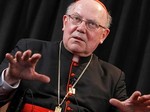 Cardinal Levada remarked: “It is the hope of the Holy Father, Pope Benedict XVI, that the Anglican clergy and faithful who desire union with the Catholic Church will find in this canonical structure the opportunity to preserve those Anglican traditions precious to them and consistent with the Catholic faith. Insofar as these traditions express in a distinctive way the faith that is held in common, they are a gift to be shared in the wider Church.”
Cardinal Levada remarked: “It is the hope of the Holy Father, Pope Benedict XVI, that the Anglican clergy and faithful who desire union with the Catholic Church will find in this canonical structure the opportunity to preserve those Anglican traditions precious to them and consistent with the Catholic faith. Insofar as these traditions express in a distinctive way the faith that is held in common, they are a gift to be shared in the wider Church.”
One might well wonder what concrete form a sharing of those gifts with the wider Church could assume. Whereas it would be proleptic to attempt to catalogue the many and diverse blessing the arrival of these anticipated new members will bring to the Church, one thing is certain. Even the most “high church” among them will have been sufficiently influenced by the Protestant sensibilities of Anglicanism to bring with them a great reverence and a high standard for liturgical preaching. A profound attentiveness to biblical preaching is the undeniable patrimony in all of its forms, including Anglicanism, despite the ambiguity some of its members may experience over identifying themselves as Protestant.
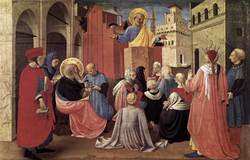 If anything, the Anglican Communion has been noted for its wide diversity. Accordingly, many Anglicans who might have answered to such labels as “high church” or “Anglo-Catholic,” could have been observed maintaining patterns of weekly (and even mid-weekly) Eucharist while simultaneously, so-called evangelical or “low-church” Anglicans might have typically attended non-eucharistic Morning Prayer most Sundays.” Broad” Anglicans would feel at home at any number of points between those two extremes.
If anything, the Anglican Communion has been noted for its wide diversity. Accordingly, many Anglicans who might have answered to such labels as “high church” or “Anglo-Catholic,” could have been observed maintaining patterns of weekly (and even mid-weekly) Eucharist while simultaneously, so-called evangelical or “low-church” Anglicans might have typically attended non-eucharistic Morning Prayer most Sundays.” Broad” Anglicans would feel at home at any number of points between those two extremes.
One value shared in common among all Anglicans, however, has been their expectation of regular and good preaching. It can be reasonably well anticipated that most Anglicans who will take advantage of the accommodations extended in the Holy Father’s Apostolic Constitution will come from the ranks of the high churchmen, and to their love for preaching it is reasonable to add the expectation that the preaching will be theological, eloquent and sophisticated. The presence of this expectation in a great number of new Catholics is good news for the Church, since this strengthen the expectation placed upon priests to enhance the quality of their proclamation of the Word. Of course, former Anglican priests who become Catholic priests will bring their refined homiletic patterns with them.
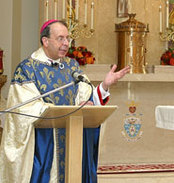 The renewal of preaching is perhaps of the most highly successful and least neuralgic of all the liturgical initiatives of Vatican II. After some decades of ambiguity, at least at the popular level, about the role of preaching in the liturgy, Sacrosanctum Concilium clarified that preaching is part of the liturgy itself (art. 52) and from that moment, a homiletic renewal unfolded. With little, if any resistance, preaching at the Mass (even at daily Mass), at the celebration of the Sacraments, at the Liturgy of the Hours and at numerous paraliturgical events has become normative and increasingly better quality. Seminaries around the world began paying better attention to the homiletic formation of seminarians, and on-going formation programs for priests are repeatedly asked to sponsor preaching workshops in their curricula.
The renewal of preaching is perhaps of the most highly successful and least neuralgic of all the liturgical initiatives of Vatican II. After some decades of ambiguity, at least at the popular level, about the role of preaching in the liturgy, Sacrosanctum Concilium clarified that preaching is part of the liturgy itself (art. 52) and from that moment, a homiletic renewal unfolded. With little, if any resistance, preaching at the Mass (even at daily Mass), at the celebration of the Sacraments, at the Liturgy of the Hours and at numerous paraliturgical events has become normative and increasingly better quality. Seminaries around the world began paying better attention to the homiletic formation of seminarians, and on-going formation programs for priests are repeatedly asked to sponsor preaching workshops in their curricula.
There will undoubtedly be moments of joy as well as suffering as the presence of the former Anglicans entering the Church under conditions of Anglicanorum Coetibus begins to be felt. That joy and the suffering will be sustained by veteran and new Catholics alike. Much uncertainty lies in the near future. What is certain however, is that the former Anglicans’ heritage of good preaching and their expectation that this will be continued will only serve the Church well as these new expectations strengthen the impetus to the charge the Church has already embraced to refine and strengthen its ministry of the Word.
All of the pieces are in place for a win-win situation. Moreover, this expectation is quite realistic, since in Cardinal Newman we will recall that precedent has already been set.
Michael Monshau, O.P., professor of Liturgy, Homiletics and Spirituality at the Pontifical University of Saint Thomas Aquinas (The Angelicum) in
Christ the King, Solemnity
He is King of hearts, too, by reason of his “charity
which exceedeth all knowledge.” And his mercy and kindness which draw
all
men to him, for never has it been known, nor will it ever be, that man be loved
so much and so universally as Jesus Christ.
-Pope Pius XI, December 11, 1925,
Qua Primas
Deaf Catholics: finding room for the deaf in the Church
From a recent Zenit news article, I learned something that I never knew before: “It is estimated that there are 1.3 million deaf Catholics,
and the Vatican is intent on ensuring that they can fully participate in the
Church.” Archbishop Zygmunt Zimowski,
president of the Pontifical Council for Health Care Ministry, gave this statistic at his department’s 24th international conference meeting this week in Rome. The conference’s theme is “Ephphata: the Deaf
Person in the Life of the Church.”
“The prelate,” according to Zenit said, “estimated that in developed countries, one child
out of 1,000 is deaf, but the problem is more serious in poor countries, where
80% of the world’s deaf live. In these cases, deafness is often the result of
insufficient medical care and lack of medication.” He indicated “the need to help people with
this impairment, precisely as ‘the world has begun to overcome the
prejudices and superstitions linked to physical disability.'”
A liturgical resource for helping the deaf is Joan Blake’s Signing the Scriptures:
Plus, there’s the DVD Tips and Techniques for Signing the Scriptures.
Bishops approve translations of last five sections of Roman Missal
BALTIMORE (CNS) — The U.S. bishops approved the English
translation and U.S. adaptations of five final sections of the Roman Missal in
voting on the second day of their annual fall general assembly in Baltimore.
With overwhelming majority votes, the bishops approved translations of the
proper of the saints, specific prayers to each saint in the universal
liturgical calendar; the commons, general prayers for celebrating saints listed
in the “Roman Martyrology”; the Roman Missal supplement; the U.S.
propers, a collection of orations and formularies for feasts and memorials
particular to the U.S. liturgical calendar; and U.S. adaptations to the Roman
Missal. There was some debate on the floor about a separate piece of the
translations — the antiphons — which has not come to the bishops for
consideration, but instead has advanced through the Vatican’s approval
procedures without the consultation of the English-language bishops’
conferences around the world. But the final five sections of the missal before
the bishops passed with minimal discussion and only a handful of proposed
amendments to the texts. The Vatican’s Congregation for Divine Worship now must
grant its “recognitio,” or approval, to allow the translations to
proceed.
Read Father John Zuhlsdorf’s perspective on the liturgical translation
issue passed today. As Father Z said, it’s over!
Dedication of the Archbasilica of Saint John Lateran
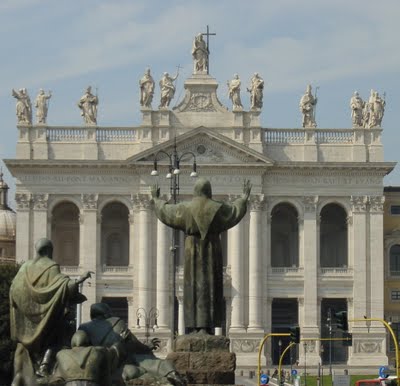 O God, who out of living and chosen stones builds up an everlasting dwelling-place for Thy majesty: help Thy people, who humbly pray to Thee, and whatever material room Thy Church may set apart for Thy worship, let it bring also spiritual increase.
O God, who out of living and chosen stones builds up an everlasting dwelling-place for Thy majesty: help Thy people, who humbly pray to Thee, and whatever material room Thy Church may set apart for Thy worship, let it bring also spiritual increase.
Blessing of Water in Honor of Saint Willibrord
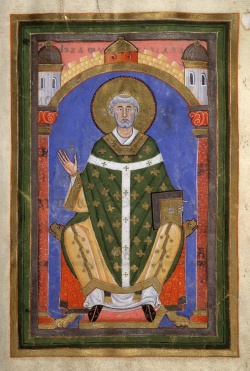 A tradition on the day which the liturgical memorial of Saint Willibrord is celebrated is the blessing of water. As we know, Catholics use the natural world to “hook” on to the supernatural world. That is, the Incarnation of the Word came into human history to hallow creation and for the redemption of the world. The Church sensing this, has organically developed blessings of things and people to lead us into the deeper reality of our faith looking toward salvation. The opening prayer for the Mass of Saint Willibrord may be found here, and ritual for the blessing of water follows.
A tradition on the day which the liturgical memorial of Saint Willibrord is celebrated is the blessing of water. As we know, Catholics use the natural world to “hook” on to the supernatural world. That is, the Incarnation of the Word came into human history to hallow creation and for the redemption of the world. The Church sensing this, has organically developed blessings of things and people to lead us into the deeper reality of our faith looking toward salvation. The opening prayer for the Mass of Saint Willibrord may be found here, and ritual for the blessing of water follows.
Saint Willibrord (d. 738) freed a home haunted by an evil spirit through the use of water blessed by him.
V. Our help is in the name of the Lord.
R. Who made heaven and earth.
Thou creature water, I purge thee of evil by the living + God, by the holy + God, that thou mayest become a saving remedy for body and soul, through Him Who shall come to judge the living and the dead and the world by fire. Amen.
Let us pray.
Bless, + O Lord, this water as a remedy for repulsing the foe of mankind, and send down on it they Holy Spirit, so empowered by heaven it may drive out both sickness and the worst enemy of all, and be a source of health to all who drink thereof. Through Christ our Lord. Amen.
Let us pray.
O Lord Almighty! Bless + this water which thou has granted for mankind’s use in washing away all guilt of sin, so that, through invoking upon it thy holy name, it may prove an unfailing and divine remedy whatever it is sprinkled or used for drink. Let this water serve to wash away every impurity, and to bestow by thy beneficence health of body and soul upon all who use it, through Him Who shall come to judge the living and the dead and world of fire. Amen.
Let us pray.
O Lord, the Father Almighty! Bless + this creature of water that it become a saving means for humankind in removing all evil of body and soul and in expelling all harmful influence of the enemy. And grant that, through invoking thy holy name, we may possess in it a safeguard for our corporal and spiritual well-being. Through Christ our Lord. Amen.
Let us pray.
O God, Who has appointed illustrious promoters of the true faith for the various nations; grant, we beseech thee, that all who come seeking the intercession of our holy teacher, Saint Willibrord, may experience the joy of good health here on earth and prosperity and the glory of beatitude in the life to come. Through our Lord, Jesus Christ, thy Son, Who liveth and reigneth with thee in the unity of the Holy Spirit, God, forevermore. Amen.
May the blessing of almighty God, Father, Son + and Holy Spirit come upon this water and remain for all time. Amen.
Honoring the dead, the companionship of saints–the Catholic way
… while we visit cemeteries, let us remember that there, in
the tombs, only the mortal remains of our loved ones rest, while awaiting the
final resurrection. Their souls — as Scripture says — already “are in
the hand of God” (Wisdom 3:1). Hence, the most appropriate and effective
way to honor them is to pray for them, offering acts of faith, hope and
charity. In union with the Eucharistic sacrifice, we can intercede for their
eternal salvation, and experience the most profound communion while awaiting to
be reunited again, to enjoy forever the love that created us and redeemed us.
… how beautiful and consoling is the communion of saints! It is a
reality that infuses a different dimension to our whole life. We are never
alone! We form part of a spiritual “company” in which profound
solidarity reigns: the good of each one is for the benefit of all and, vice
versa, the common happiness is radiated in each one. It is a mystery that, in a
certain measure, we can already experience in this world, in the family, in
friendship, especially in the spiritual community of the Church. May Mary Most
Holy help us to walk swiftly on the way of sanctity and show herself a Mother
of mercy for the souls of the deceased. (Pope Benedict XVI, Angelus Address, November 2, 2009)
O loving and sustaining Lord: in honor of Saint Charles Borromeo
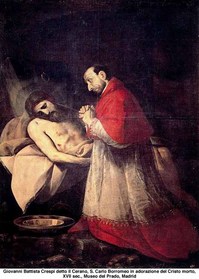 1. O loving and sustaining Lord,
1. O loving and sustaining Lord,
A joyful song your people raise
On this, our patron’s festive day
And sing your love in thankful praise.
2. A bishop faithful to your word,
A pastor loving to the sheep,
Charles preached the Gospel truth to all,
And strove th’Apostles’ faith to keep.
3. A lover of the Cath’lic faith,
He worked to build within his see
A knowledge and a love of God
That all in Christ be fully free.
4. His tireless striving for the poor
Was modeled on the Christ, his Lord;
He taught the doubter and the lost
And brought the beggar to his board.
5. All glory, Lord, to you we sing,
And thanks for Charles your bishop bring,
As we the Father now adore
And Holy Spirit, evermore.
J. Michael Thompson
Copyright © 2009, World Library Publications
LM
PUER NOBIS, WINCHESTER NEW
